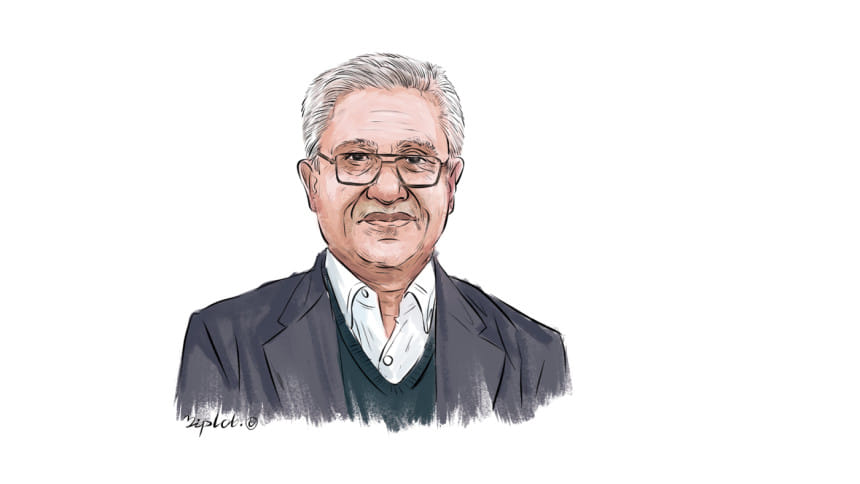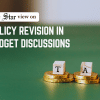Be realistic, avert risks

In a country weighed down by high inflation, dwindling fiscal space and weak investments, now is not the time for illusions.
The interim government, free from electoral compulsions, has a rare chance to reset the national budget on a rational footing. The coming fiscal year demands a departure from grand narratives and exaggerated promises. Instead, the focus must shift to what is financially feasible, credibly fundable, and economically responsible.
That is the central message from Zahid Hussain, former lead economist at the World Bank Dhaka office, who in an interview with The Daily Star urged the government to pursue a prudent and realistic national budget grounded in hard fiscal truths.
The total budget size, he contends, should avoid the excesses of political grandstanding. "The total size of the budget should not be overly ambitious," Hussain said. "Given the current financing constraints, a budget of around Tk 720,000 crore would be reasonable."
He cautioned against a recurring pattern in budget cycles.
"Every year, right after the budget is announced, you hear the same familiar comment: the budget is overly ambitious." Political governments, he said, have traditionally used budget figures as a propaganda tool, aimed at showcasing artificial economic strength and justifying expanded spending.
"The interim government doesn't have to worry about those things. It doesn't have to create excessive expectations in the minds of the public," he said.
In determining the budget size, financing availability, and a manageable deficit must be the guiding principles. "It should be considered mainly in terms of financing. There are two components -- the size of the deficit and total revenue that can realistically be expected," said Hussain.
While Bangladesh has historically relied on domestic borrowing, this strategy has clear limits. "I don't think you can expect more than Tk 120,000 crore of domestic borrowing without creating pressure on interest rates and on the exchange rate," he cautioned. This pressure on the banking system would inevitably crowd out private sector credit.
Hussain emphasised the need for external financing to play a greater role, but warned against counting mere commitments. "The most important thing is a commitment of foreign financing, a commitment that is in the pipeline and disbursed," he said.
The economist estimated that with proper management, Tk 100,000 crore in external financing could be realised in fiscal 2026.
Even with strong external support, he warned that achieving Tk 500,000 crore in domestic revenue would be difficult, making deficit control even more urgent.
Hussain was adamant that monetising the deficit -- borrowing from the central bank -- must be avoided at all costs. "We are ruling out the option of borrowing from the Bangladesh Bank," he said. "The budget cannot be financed by printing money."
Drawing from experiences, he said devolving treasury bills to the central bank only "fed inflationary pressures. We did this in the past and paid for it."
Instead, deposit growth must be the backbone of sustainable domestic financing. "To get domestic financing without crowding out private credit, without creating pressure on interest rates and the exchange rate, deposits have to grow," he said. "Otherwise, the math won't add up, and you would need to cut the deficit."
NO ALTERNATIVE TO TAX REFORM
The broader fiscal situation, Hussain argued, highlights the urgent need for structural tax reform. Bangladesh's tax-to-GDP ratio remains far too low to sustain rising public spending. "We need to move towards greater reliance on direct taxes such as personal income tax, corporate income tax, and wealth taxes," he said. "Reliance on indirect taxes, particularly taxes based on import values, has to decline, given global situations and forthcoming LDC graduation."
He highlighted a deeply flawed tax structure riddled with exemptions and multiple rates, which facilitate evasion and abuse. "Multiple rates and exemptions create discretion, and discretion invites misclassification, evasion, and rent-seeking," he said.
Citing estimates from the local think tank Centre for Policy Dialogue (CPD), he said tax evasion cost Bangladesh Tk 226,236 crore in FY2023, with half stemming from corporate tax evasion. "If tax evasion exceeds half of actual tax collections, you have to ask yourself: how is this happening?" he said.
Among key reforms, simplifying the value-added tax (VAT) regime should be a priority. "I think the beginning point is to move towards a single VAT rate. Not necessarily 15 percent -- by international standards, it is on the high side," Hussain said, suggesting a 12.5 percent rate as more appropriate.
He called for eliminating special rates like turnover tax, truncated VAT, and package VAT. "These need to be rationalised, meaning they must eventually be eliminated," he said, noting that the reform cannot be done overnight but must steadily be attained to curb evasion.
Hussain also urged caution in raising personal income tax exemption thresholds, arguing that "we do not have the luxury of providing large revenue giveaways through exemption increases." He said such increases also benefit high-income groups and have minimal impact on the poor. However, an inflation adjustment could bring some relief to the middle class. If such an adjustment is made, the government would need to find ways of offsetting the resulting revenue loss.
REVIEW DEVELOPMENT PROJECTS
On the expenditure side, Hussain said that structural constraints limit the government's flexibility. Salaries, pensions, debt servicing, and subsidies consume a significant share of the budget. "When you look at the expenditure side, the government's space for reform is limited," he said.
Still, some rationalisation is possible. "We have to ask ourselves: where are we spending the money, and how do we divide it between the operating and development budgets?" he said, calling for greater strategic planning in resource allocation.
He lauded recent efforts to scrutinise the Annual Development Programme (ADP) and reduce non-essential spending such as on buildings, vehicles, and foreign travels within projects. The focus has shifted not only to reducing the number of projects, but also to identifying savings within project components.
On the subsidy front, Hussain noted that fertiliser subsidies offer little flexibility, but mechanisation subsidies in agriculture might be reconsidered.
He welcomed recent steps to renegotiate contracts with independent power producers and reduce Power Development Board subsidies by reducing costs, adding that "the government is under heavy pressure from the IMF on this."
Timely disbursement of subsidies is also critical. "The release of subsidy funds must happen on time to prevent arrears from building up because of late payment penalties," he said.
Export and remittance subsidies should be re-evaluated. "Remittance subsidies have not achieved their intended effect," he said. "Recent remittance boom is attributable not to the subsidy but to a slump in illicit outflows."
Despite its limited tenure, the interim government has the opportunity to lay the groundwork for institutional reform, according to the economist.
"One footprint could be completing the separation of tax policy and tax administration," Hussain said. While some progress has been made, dedicated policy and implementation departments must still be established. "Resistance has already surfaced," he noted.
He also urged simplification of the corporate tax structure, which currently ranges from 10 percent for green garment factories to over 45 percent for tobacco and telecom companies. "I think the corporate tax rate structure needs simplification."

 For all latest news, follow The Daily Star's Google News channel.
For all latest news, follow The Daily Star's Google News channel. 








Comments